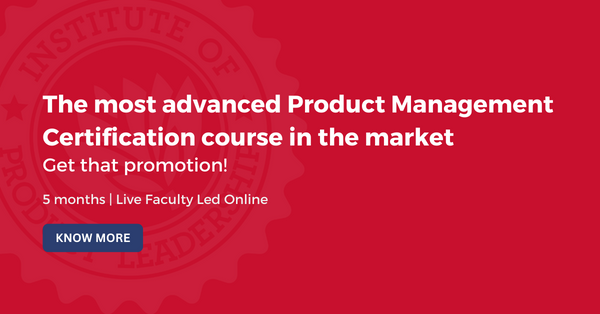AI-Enabled PM Transforming the Future of Product Leadership
- Career
- 5 min read
Product management is changing significantly. Traditionally, product managers have been using customer feedback and market research and strategic intuition to make decisions. The advent of AI has brought about a new era of AI-product management where data-driven insights, predictive analytics, and automation are transforming the design, construction, and scaling of products.
According to McKinsey, businesses can increase productivity by as much as 30 percent and shorten time-to-market by incorporating AI into their product processes.
What is AI-Enabled Product Management?
AI-enabled product management involves applying artificial intelligence tools and techniques to the various stages of the product life cycle-including ideation, development, launch, and growth, not to replace the product manager, but to provide them with stronger capabilities to make more intelligent, faster, and customer-informed decisions.
AI Use Cases Across the Product Lifecycle
AI’s impact is visible across every stage of the product lifecycle.
Stage | AI Applications | Examples |
Ideation and Market Research | Trend analysis, sentiment mining, competitive intelligence, customer behavior insights | Flipkart using AI to track real-time shifts in consumer demand |
Development and Roadmap Prioritization | Feature success prediction, resource optimization, churn forecasting | Mixpanel and Amplitude applying ML to forecast adoption and feature impact |
Launch and Personalization | Recommendation engines, targeted campaigns, adaptive onboarding | Netflix, Amazon, and Swiggy personalizing experiences to boost adoption |
Growth and Optimization | Demand forecasting, automated A/B testing, anomaly detection, and predictive analytics | Razorpay detecting fraud patterns, HealthifyMe delivering personalized health coaching |
Ideation and Market Research
AI helps in identifying patterns and ideas from large datasets that traditional methods ignored. Product managers can use AI to know customer behavior, industry trends, and competitors. For example, Flipkart and Meesho, Indian e-commerce platform, use AI to identify shifts in consumer demand in real time, allowing PMs to verify product ideas faster.
Development and Roadmap Prioritization
During the development process, AI-enabled analytics platforms will help product managers assess which features are likely to be successful. The platforms such as Mixpanel or Amplitude, use machine learning to predict the rate of adoption, customer churn, and the effects of different features. Many project managers will subsequently be able to focus their precious resources on the initiatives that maximize both business and customer value.
Launch and Personalization
Personalization becomes a make-or-break factor for user adoption during the launch phase. Netflix, Amazon, Swiggy, and alike follow recommendation engines to provide users with specific treatment. AI product managers ensure these systems are followed at strategic levels and are implemented to produce measurable outcomes, such as greater engagement and retention.
Growth and Optimization
Moreover, AI is a strong contributor to the process of scaling and upgrading products after their market entry. By applying predictive analytics, the future trend of demand can be estimated so as to prevent any likely problems. In the financial technology and health sectors, the predictive models have been aiding the compliance, the safety and the satisfaction of the customers. Apart from this, the performance of experimentation and A/B testing, the efficiency of which has been increased due to outcome analysis automation, has been improved by AI.
Benefits of AI-Enabled Product Management
AI increases the precision of understanding customer needs, enables product managers to make decisions more quickly and intelligently, and expands personalization and experimentation to new levels. AI enables better alignment of product features with market opportunities and increases ROI of product efforts.
Gartner predicts that organizations that rely on AI for product decision-making will have a customer satisfaction score 20 percent higher than organizations that solely rely on conventional approaches to decision-making by 2026.
What does it mean in the Indian Context?
India is increasingly becoming a hub for AI-driven product leadership. According to NASSCOM, AI-led business value in India could reach more than USD 500 billion by 2025, with product leads positioned to be at the heart of this transformation.
Some startups, like Razorpay and HealthifyMe, are embedding AI in areas like fraud detection and personalized health coaching, and large enterprises, such as TCS and Infosys, are investing substantial resources to train product leads to employ an AI-first approach into their global client projects.
The Evolving Role of the Product Manager
AI does not replace the human aspects of product leadership. Empathy, vision and stakeholder management continue to be irreplaceable. What AI offers is augmentation of the PM’s ability to synthesize data into strategy, work with different technical teams, advocate for responsible use of it, and balance human judgment with algorithmic recommendations.
Product managers of the future will be distinguished by their capacity to responsibly integrate AI while maintaining creativity and customer-focused empathy. As the Harvard Business Review notes, “those who take advantage of AI will not only deliver better outcomes, they will help drive the next wave of industry innovation.”
Product management that facilitates the adoption of AI will define product management going forward. AI has the ability to be integrated into ideation, development, launch and growth – therefore enabling higher value and products that are more able to adapt to the needs of customers and the market.
The future of product leadership belongs to those who can combine growth vision with AI enabled execution.






